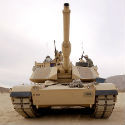The Pentagon is considering using DSS technology to share the 3100-3550MHz spectrum band with commercial users. The issue again raises the potential for a wholesale 5G network.

The Pentagon is floating a proposal that would leverage Dynamic Spectrum Sharing (DSS) technology to allow the US military to share the 3100-3550MHz spectrum band with commercial users.
The details of the proposal are vague, but it hints at a desire by the Pentagon to retain ownership of the 3100-3550MHz band for military "training, readiness, and lethality" and to "lease" it to the wireless industry for commercial 5G services. The Pentagon's "request for information" (RFI) seeks feedback on the idea, but the Pentagon warned that the proposal "does not commit the Department of Defense to contract for any supply or service whatsoever."
Nonetheless, the suggestion that the US military might be willing to share its vast spectrum resources with commercial operators in the US represents a major development in a sector that has traditionally allocated spectrum via winner-take-all auctions.
Some in the industry cheered the development. "We congratulate the DoD for its inquiry and look forward to working with all stakeholders so that this spectrum eventually sees greater use," said the Wireless Internet Service Provider Association (WISPA), which represents the nation's smaller fixed wireless Internet operators.
But others are not so keen on the idea. "We must stay the course and focus on private-sector solutions," said Nick Ludlum with the CTIA, according to the Wall Street Journal. CTIA is the main trade association for big US wireless network operators like Verizon and AT&T. Ludlum noted that there are already a number of nationwide 5G offerings by existing operators.
According to the Wall Street Journal, supporters of the Pentagon's proposal said it would be similar to FirstNet, a government program that allocated spectrum and billions of dollars for the creation of a nationwide wireless network for public-safety users. AT&T won the contract to construct the FirstNet network in 2017, and today the network covers 99% of the US population and counts 1.3 million connections.
The WSJ also reported that the Pentagon's proposal has already attracted interest from defense contractors.
DSS technology is currently being tested by the likes of AT&T and Verizon to roll out 5G across spectrum also used by 4G. The technology can essentially transmit both 4G and 5G in the same spectrum band in 1 millisecond increments.
Raising the specter of nationalized, wholesale 5G
The notion of the US military sharing spectrum with commercial users is not necessarily new. After all, the FCC recently completed an auction of 3.5GHz CBRS spectrum licenses that must be shared between commercial users and the US Navy.
However, there is a growing chorus of voices arguing for the US military to embark on some type of nationalized, wholesale approach to releasing its spectrum holdings for commercial 5G networks. For example, just days before the Pentagon released its RFI, Eric Schmidt and Karl Rove spoke at the virtual Incompass trade show about the possibility of such a sharing scenario.
Spectrum auctions are "not the most efficient use of the spectrum," Schmidt argued. Schmidt ended his longtime advisory role with search giant Google earlier this year, and just this month he ended a three-year term on the Pentagon's Defense Innovation Board.
Schmidt said that "China has already won" the race to 5G, considering the country is on pace to count fully 120 million 5G customers by the end of 2020. He described the situation as a "national emergency" that could be addressed by rapidly releasing US military spectrum for 5G.
Karl Rove – a longtime GOP strategist – echoed Schmidt's position on the topic, noting the two had been working together on the issue. And Rove expanded on the notion of spectrum sharing by arguing for much broader changes to the US wireless industry. He said the US military's spectrum should be used to construct a nationwide 5G network that would be available to Americans and other network operators on a wholesale basis. He likened the setup to the wholesale electricity market in Texas.
Rove argued that a wholesale 5G network would help Americans cross the digital divide as well as bolster the country's position against China.
Rove is a lobbyist for Rivada Networks, which has touted technology for becoming a wholesaler of US government spectrum. Rivada competed with AT&T for the US government's FirstNet contract and has pursued similar opportunities in other countries around the world.
It's unclear whether such proposals have trickled into President Trump's re-election platform. One of the 51 items on President Trump's re-election platform is to "win the race to 5G and establish a national high-speed wireless Internet network."
That's noteworthy language considering White House officials including President Trump publicly rebuked a similar proposal for a nationalized 5G network in early 2018.
— Mike Dano, Editorial Director, 5G & Mobile Strategies, Light Reading | @mikeddano
About the Author(s)
You May Also Like











